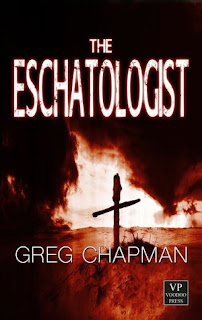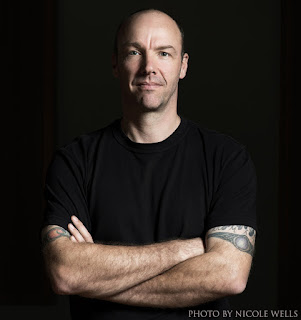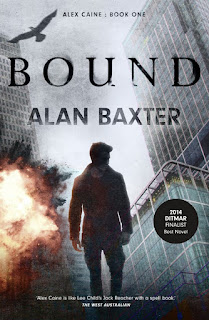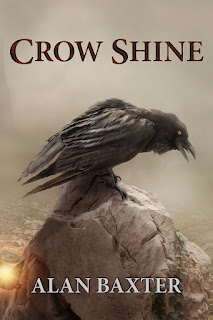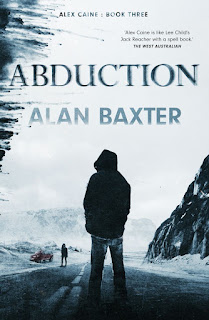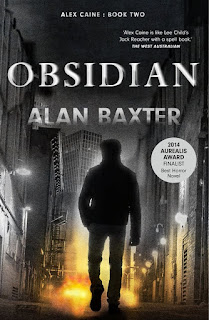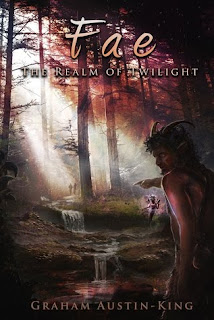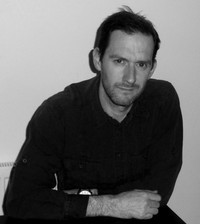Hello Peeps!
I am chuffed to bring you an interview I've wanted to do for a long time. A very long time.
John Hornor Jacobs has been one of my favourite authors since he first released his debut novel Southern Gods. John took time out of his very hectic schedule to shoot the breeze with me, and share some rather disturbingly hilarious tales from his youth.
Read on... if you dare.
John Hornor Jacobs, welcome to Smash Dragons.
I started writing seriously in November of 2007 for National Novel Month and it was then I wrote the first half of Southern Gods. Since then, I’ve written nine more novels, a passel of short stories, a few novellettes. And now I’m coming to the end of my writing contracts and I have to figure out what I want to do with the rest of my writing career.
Was writing something you always envisaged yourself doing one day?
I think so, though I can’t recall formally stating “I want to be a writer” at any point. I was always a bookworm – once, when I was eleven, my father’s friend busted me with a book in my waders in a duck blind, much to my father’s embarrassment – and I think most early readers at some point want to add their stories to the great human chorus.
I was 37 when I formally declared that I wanted to write a novel, but I never thought of it as “becoming a writer.” I’ve worked in advertising as a creative so long, writing copy, designing and programming websites, making animations, working on television commercials, writing a book seemed a big task, but not an insurmountable one.
Can you remember the first story you wrote? What was it about?
I was born in 1971, and distinctly remember the fear and dread that accompanied the cold war and the threat of nuclear Armageddon. The film The Day After affected me deeply, plus books like Alas, Babylon and Farnham’s Freehold and countless others that depicted nuclear holocaust – well, they kinda fucked me up. I remember, during thunderstorms, wondering if every flash of lightning was actually an ICBM detonating. In my spare time, I would draw plans for underground shelters, that I fully intended to build, in our backyard. But I was realistic for a kid: I knew that I wouldn’t be able to dig out a shelter by myself for my whole family, so I designed them just for me. And, looking back on them, they very much resembled deluxe coffins.
All that considered, it wasn’t surprising that when I wrote my first story, in the third grade - it was a story of the apocalypse, about a boy who lives in a cave and has to fight off radioactive wolves. My mom has it somewhere in her files, but she’s suffering from dementia, and can’t recall where she filed it. I imagine I’ll find it again someday. Some very sad day.
Your work covers a wide range of genres and topics. Do you have a preferred niche, or are you someone who loves to cast their creative net widely?
Your work covers a wide range of genres and topics. Do you have a preferred niche, or are you someone who loves to cast their creative net widely?
 I have said elsewhere, I am creatively restless. I’m more geared toward writing standalones, exploring whatever creative challenge that appeals to me at the time, and moving on once it is done. Which is funny, because I’m coming out of a long tunnel of writing two trilogies. It’ll be a while before I write anything that long again, unless it’s a single book. That’s the deal with trilogies, really – they’re really one long-ass book, sold on the strength of the first third and published in sections. Longer series differ, but trilogies on the whole are just fragmented standalones.
I have said elsewhere, I am creatively restless. I’m more geared toward writing standalones, exploring whatever creative challenge that appeals to me at the time, and moving on once it is done. Which is funny, because I’m coming out of a long tunnel of writing two trilogies. It’ll be a while before I write anything that long again, unless it’s a single book. That’s the deal with trilogies, really – they’re really one long-ass book, sold on the strength of the first third and published in sections. Longer series differ, but trilogies on the whole are just fragmented standalones.
My agent came into town recently, and we discussed my career, and discussed my strengths, my weaknesses, and what I wanted to do in the future. What became clear in that conversation is that I always write about family. And when she said that, it was like a cloudburst to me. Whatever genre I’ve dipped my toes in, I’m always coming back to family, its problems, its dysfunctions, its strengths in the face of adversity. I think that’s my niche. Writing about family.
I’ve read that all literature is a conversation about family and human connection. I haven’t found an exception to that yet.
The South features prominently throughout your work. What is it about that region in particular (apart from being born there) that appeals to you as a writer?
The American South appeals to me for the same reasons that many dystopias appeal to writers. Edges of frontier, desperately marginalized peoples, poverty, brutish class systems, inequality, gun culture, hatred – most of the South is a pre-packaged dystopia for your reading pleasure. Plus, I grew up here, I live here, I know the people and places, their rhythms and aspirations. I find it fascinating to explore my own culture.
You deal with some incredibly strange (and cool) things in your writing. I’m curious, what’s the strangest and most bizarre thing you’ve ever seen?
I went to an authentic hog slaughter once. It was… traumatizing. Most of the bizarre things I’ve seen in my life were related, chiefly, to human behaviour. It’s nothing compared to war stories. But there it is.
I adored your mash up of Southern Gothic, Weird fiction and Cosmic Horror in Southern Gods. Where did this story start in your minds eye?
Big change of gears, here. First of, thank you. I’m glad you liked it!
It started with assorted interests and a few images. A&R reps in the 50s, the birth of rock-n-roll, the history of race music in Arkansas in the South. Pirate radio stations, and crime noir. In my mind, when I wrote Southern Gods, I was writing a crime noir novel, firmly rooted in the tradition of gumshoe protagonists hunting down their appointed targets, but mashed up with Southern Gothic and the supernatural.
Was it a long process of thinking things through, or did you get a flash of inspiration? How long did it take you to write?
Much of the writing, honestly, I can’t remember. The way I often work is I have ideas for scenes – say, when Bull Ingram finds the dead man in the radio station, with a record still spinning on the turntable – and I write with that in mind, getting my protagonists to that situation. Much of the rest, as in most crime noir, is connective tissue, establishing a narrative voice, instilling dread through tone and diction, slathered with setting and mood.
As I said earlier, I wrote the first 50,000 words during National Novel Writing Month and took four or five more months to complete and polish into a shape I was ready to start shopping. Concurrently with the writing of the novel, I was doing everything I could to learn about the publishing industry, how it worked, what was getting published. I join online communities, Twitter, Facebook. I blogged (something I don’t do much anymore), and attended various conventions.
R&B and Blues pay a central role in Southern Gods. I’m curious, what songs and artists did you listen to whilst writing it?
You’d think I listened to a lot of Robert Johnson, wouldn’t you? I didn’t. I listened to Alan Lomax’s recording for the Library of Congress. Field hollers, penitentiary call and response cotton chopping songs.
And, strangely, I listened to a lot of Sufjan Steven’s Come on Feel the ILLINOIS.
I wrote this years ago in answer to a similar question, so I’m posting it here:
“I grew up on the rhythms of the South. Blues, soul, gospel and country were the constant accompaniment to the long car rides with my father, crisscrossing Arkansas, towing a flatbottom, a full cooler, and rods and reels and shotguns. In every country store dotting the landscape of the delta there was music; you open the door with a creak and the customer bell rings, a voice thick with tobacco and molasses and bacon-fat greets you. The air-conditioner hums and the strains of a gospel choir, tinny and indistinct, sound from the radio above the counter, tuned to the AM band. The hiss of a Coca-Cola being opened and the bright clatter of the cap falling to the floor. The snick of a Zippo. The husky laugh of a woman hefting a child on her hip. Barefoot feet slapping on a poured-concrete floor.
When I sat down to write Southern Gods, the amalgam of music from a lifetime of living in the Delta welled up and came out, in one way or another. It spilled into my plot, into my style. Maybe into my voice. I don’t know. But I know what I wanted it to sound like. It needed pain and horror and the suck of gravity.”
Your post-apocalyptic novel This Dark Earth is pretty brutal reading. What sort of research did you do in order to nail down that realism?
I worked with a pathologist to develop a plausible zombie virus, though zombies are inherently nonsensical. I did some research on the U.S. Army, but I had worked on the Army of One television campaign, so I’d been around a lot of the war machines in the field, like the Bradley Fighting Vehicles and Apache helicopters, and could fake the rest. That book was pretty much my zombie survival plan in novel form.
I was hesitant about your latest series when I first read a synopsis. I struggled, initially, to get my head around the direction you were going in. Once I started reading The Incorruptibles however I was hooked. The western tones, the bizarre infernal driven machines, the alternative history and fantasy mash up. Where on earth did you draw your ideas for this series?
 When I was a kid, I misheard “internal combustion engine” as “infernal combustion engine,” and that miscommunication stuck with me. When I used to be a semi-professional musician, I wrote a song called “Infernal Machines” and always loved that idea, engines powered by daemons. From there, it was figuring out how to use that in a story.
When I was a kid, I misheard “internal combustion engine” as “infernal combustion engine,” and that miscommunication stuck with me. When I used to be a semi-professional musician, I wrote a song called “Infernal Machines” and always loved that idea, engines powered by daemons. From there, it was figuring out how to use that in a story.How have you changed as a writer since the release of your first book?
I hope I’ve become a better writer. On a technical, sentence to sentence, paragraph to paragraph level, I know I’m a better writer. Am I a better storyteller? Maybe. Book sales would indicate no on both points, as Southern Gods remains my most popular book.
One of the things I deeply admire about you as a writer is your ability (and courage) to experiment with different voices and tones throughout your books. You have written books in the first person with past tense, first person with present tense, third person and even had an epistolary chapter in This Dark Earth. What is the motivation behind this constant state of change? Are you looking to avoid being cast as a writer who only does one sort of thing?
At one time, I was a big fan of Dan Simmons. Once I got to know him some, and learned more about him, his personality and his crazy right wing political leanings, my admiration for him somewhat cooled. But early on, I thought that his career would be a good model for mine, writing widely in any genre that I enjoyed or drew my attention. On a personal satisfaction level, it was a good choice. Career-wise, it might’ve been ill-considered. I’ve had three debuts – one in horror, one in young adult, one in fantasy. Not a lot of the fans I managed to attract in one followed me to the others during my literary perambulations. But I’ve enjoyed the journey.
I must admit I adore the way you depict some of your characters. Bull, Fisk, Shoe, Livia, Lucy and Shreve are all amazing and memorable, and have such authentic voices. What makes a good character in your opinion? How do writers achieve authenticity when writing?
Characters with flaws are interesting. Those characters that have their own voices, and viewpoints, they tend to take off – even if they’re horrible people, they have their own momentum.
What motivated your decision to venture into YA with The Twelve Fingered Boy? How does your writing process change when writing a series aimed at a younger reading age bracket?
I like YA fiction, it deals with the crucible of adolescence that, with the exception of a few folks that seem like they never were kids, we all went through. So it taps into some universal truths about the human condition.
The main difference between writing for teens and adults is, adult literature is often told from a POV that is from a great remove – of time, of voice – and for literature to really connect with teens, it needs to feel like your characters are in the shit, right then. This is why, possibly, present tense is so popular in young adult books.
Take me through a day (or night) of writing with John Hornor Jacobs? Do you plan or pants it? Do you have a preferred writing space? What is your beverage and snack of choice when working?
I’ve had a hard year, writing-wise. Two years ago I became a partner in an advertising agency, and since then I’ve been working 60-70 hour weeks and my writing taken a toll. But now we’ve expanded, I have a couple of assistants, and I’m not working as much and even finding time at the office to write. I used to be able to do my job at 60% in positions at other companies and write the rest of the time. That went away with the partnership.
In general, my writing day starts with my commute, which is about 20 minutes, tops. I don’t listen to music or news. I drive in silence and think about the book. It’s usually very productive time. When I arrive at work, I usually have thirty or forty minutes before anyone else arrives and I’ll write then. I’ll write when a job stalls out, or I’m waiting for something from a client or a coworker (and that happens quite often). When I get home, I spend at least three or four hours with my family, chatting, having dinner, going to Cuong Nhu classes with my daughters. At some point, I’ll wander down to my home office and write. That might be 9:30 or 10, and by then, I’m pretty tired. If I can write a thousand words in a day, I consider that a really good one. Occasionally, my wife will give me weekends off where I can head out to the lakehouse and really buckle down.
I don’t have a preferred writing space, or choice beverage, though in the day I tend to drink tea and water and at night I tend to drink wine.
Woah… I had no idea you were a martial artist! That’s cool!! How long have you trained in Cuong Nhu? Does having a background in martial arts help you choreograph fight sequences in your books?
I wouldn’t call myself a martial artist. I am just a guy who trains in a martial art. Martial “artist” seems to imply some sort of mastery, of which I have none, other than maybe I can punch hard and I’m passable at sparring (but a lot of that is just because of my build and height). I’ve been doing it for about four years now, and I’m about half-way to being able to test for black belt in this discipline (maybe half-way – it takes around eight years of constant training, approximately). And the more I train, the more I realize there’s a good possibility I’ll never reach black belt. I’m 45, and a big guy – some of the things they ask you to do are hard for 25 year olds – forward rolls, backward rolls, side drops, serpent stance, flying kicks – so maybe it will never happen. But I enjoy the community of the dojo and I enjoy doing the work.
How has your career in advertising helped you when it comes to writing? What skills do you think transfer well between both professions?
Because I'm primarily a visual creative, I’m used to executing things quickly and having them be complete in a short amount of time. I think that gave me the confidence to try something longer. You just don’t get jobs in advertising that take a year (or more) to produce.
 You’ve written a number of short stories over the years, but not as many as I expected I must admit. Why is that? Do you prefer to work with a longer format, or is it a case of not having the time to juggle all of your longer projects with shorter works?
You’ve written a number of short stories over the years, but not as many as I expected I must admit. Why is that? Do you prefer to work with a longer format, or is it a case of not having the time to juggle all of your longer projects with shorter works?
When I started out, I made a decision to focus on writing novels, because, in the end, the possibilities of reward from longer fiction seemed greater. That might have been a mistake. But I’m writing more short fiction now, relearning the craft. Writing a short story, a really good short story, is very very hard. Much harder than writing a novel.
What’s your take on the horror genre right now? Have you noticed any new trends emerging? What can we as a genre do better in light of all of the recent controveries?
I love horror, and read it, but not solely and extremely widely, so I couldn’t tell you what the trends are. I wasn’t aware of any controversy in horror – or maybe I was and can’t recall, since there’s a literary controversy every day. But if I was going to tell you my favorite horror novels I’ve read this year, Paul Tremblay’s A Head Full of Ghosts, would be a the top of the list, followed by Daryl Gregory’s We Are All Fine.
I’m far more familiar with horror movies, actually.
What’s the most loved book in your library? Why?
I have first edition copies of Faulkner’s Sanctuary, The Reivers, and A Light in August. But those are just possessions and don’t mean much. My own books have more emotional significance to me, but I don’t reread them. Usually, the books that mean the most to me are those on my bedside table, the ones I’m currently immersed in.
The most important book in my life is always the one I’m writing.
Who are your literary influences?
Twain, Bellairs, Faulkner, Stout, Tolkien, Westlake, Chandler, Hammett, More, O’Connor, King, Simmons (like him or not), Homer, Shelley, Stoker, GRRM. There are so many. Any and every book I’ve ever read has left its mark.
You mentioned your Zombie Survival Plan earlier. I’m curious… which other authors would make your Zombie Survival Team? Why?
Zombie survival team? I wouldn’t want any authors, whatsoever. None of them would lead – possibly with the exception of maybe Myke Cole - but they’d all have firm and vociferous opinions on what we should do. I’d prefer to have carpenters, laborers, and construction workers. People who’ve spent most of their life working with their hands and know the value of labor. Surviving the zombie apocalypse is dirty work.
Funniest thing a fan has ever said to you?
Not exactly a fan, but someone from high-school asked me seriously why I drive a Honda if I’m a published author. “You can drive anything you want now you’re rich and famous!” A gentleman in London introduced himself to me and started praising me up and down for my books, which was really sweet, until it became obvious he thought I was Ben Aaronovitch.
What sorts of stories enthral John Hornor Jacobs?
Books with bears doing human things.
Best new writers emerging now that the general public may not have heard about?
Daniel Polansky, Robert Jackson Bennett, Molly Tanzer, Daryl Gregory, Stark Holborn, Bo Bolander, Den Patrick, Ed Cox, Matt Fuckin’ Wallace. These folks are really killing it.
What are you working on right now? Do you plan to ever revisit any of your former worlds (Southern Gods for example)?
I’ve got a story, maybe a novella, in mind for some of the characters (those that lived, at least) in Southern Gods. I had a loosely planned sequel to This Dark Earth plotted, about what the world looked like 15 years after the events of first book, called Zero Mountain but TDE didn’t sell well enough to pursue it and I moved on to other things. Like I said, I’m creatively restless and don’t want to have to write the same book over and over.
If you could meet one other author, and pick their brain over a beer, who would it be? Why?
I would’ve said GRRM, but I’ve already done that. So, I would love to have a chance to speak with Jo Rowling, not only because me and my whole family love her books, but also because she’s just a lovely person all around.
To what dark entity must I make a sacrifice in order to be allowed to purchase a signed book of you?
You would have to sacrifice Mammon. Though usually you sacrifice stuff to get the dark entities.
And finally, best advice you have for any budding writers out there?
Malcolm Gladwell’s 10,000 Hour Rule stipulates that you have to do something for, you guessed it, ten thousand hours for you to become a master at it. Ten thousand hours is a long ass time. Reading counts toward writing.
Write.
Read whatever you can. For god’s sake, read out of genre. Read classic literature, read modern non-fiction, read literary, read thrillers, read kids books. If you’re gonna write horror, don’t just read horror.
Write.
Go to college, if you can. You definitely don’t need college to become a writer, but you’ve got to make a living until your book hits. Learn to cook cabbage. Learn to cook rice.
Write.
Fall in love. Fall out of love. Get in fights. Indulge in arguments.
Write.
Put yourself in situations that scare you. Walk in the woods, alone. Scream as loud as you can, until your lungs and vocal cords can do no more.
Write.
Build a fire and look at the stars. Run down a long hallway. When you cut yourself, push the pain aside long enough to perceive the pain, to hold it in your mind.
Write.
Examine conflict, in yourself and others. Examine your fellow humans, figure out why they act as they do. Listen to the way people talk.
All in all, become a student of humanity, in all its terrible glory.
Write.
John Hornor Jacobs, thanks for stopping by!
You can find all of John's books at all good book outlets. I implore you all to go out and buy them... you won't regret it. You can also stalk (follow) John and find out what's going on in his life via his website.
John Hornor Jacobs, thanks for stopping by!
You can find all of John's books at all good book outlets. I implore you all to go out and buy them... you won't regret it. You can also stalk (follow) John and find out what's going on in his life via his website.




